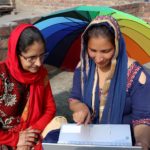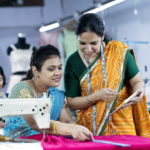Children who grow up in poverty are more likely to experience poverty in their adult lives, manifesting intergenerational poverty traps. Studies with long-term panel data show that the poverty status of households in their childhood is associated with their human capital, occupational choice, income, as well as their age of marriage, fertility, and migration. While…
RCT
Female Entrepreneurship and Professional Networks
Despite being the only region in the world where there are more female entrepreneurs than men, the vast majority of female-owned businesses in Sub-Saharan Africa are microenterprises and women’s businesses earn 34% lower profits than male-owned ones. Identifying the constraints faced by female entrepreneurs is vital for fostering economic growth. Recent studies have shown that…
Commuting Constraints and Labor Productivity: A Field Experiment on Women’s Mobility in India
Can alleviating commuting constraints enhance the labor supply and labor productivity of women from low-income households? This project studies this question in collaboration with the largest gig-firm in India, engaging 40,000 gig-workers, including 17,000 female workers. These workers commute to clients’ residences to provide a variety of services, including salon treatments, spa services, and home…
Paternalistic Discrimination
Women in South Asia are often excluded from the labour market, reducing their financial autonomy, and negatively impacting their physical and mental wellbeing (Verick, 2014; Field et al., 2021). Large government interventions have failed to close the gender employment and wage gaps for over two decades (NIPORT 2007–2017, BBS 2018). This shows that education and…
Together to Work? Role of Travel Buddies on Women’s Employment and Mobility
The labour market participation rate for women in India is significantly low, with only 25 women for every 100 men being engaged in the workforce. This striking disparity is far below the global average of 66.7 women for every 100 men. Existing data and observations suggest that societal norms and concerns about safety restrict many…
From Jobs to Careers
Women’s participation in the labour market increases economic growth at both the national and firm level, yet women worldwide still face significant labour market challenges. Current research on women’s labour market experience in developing countries mainly focuses on short-term jobs. We propose shifting the focus from jobs to “careers,” i.e., occupations characterized by a long-term…
Improving Childcare Quality through Social Franchising
Access to high-quality childcare is central to advancing women’s economic and social agency while promoting children’s development. However, in many LMICs, childcare markets are largely informal, with care often provided in unregulated home-based settings. As a result, childcare is often of poor quality, while also being unprofitable and unaffordable. Mothers typically bear the burden of…
LinkinOut Harassment
The issue of sexual harassment in the workplace remains pervasive, despite being illegal and a violation of human rights. Approximately one in two women experience sexual harassment during their work lives, with half of them experiencing three or more incidents. However, reporting of harassment is often hindered by stigma, psychological costs, and fear of retaliation.…
Studying the Latent Demand for Female Labour in Rural India
In lower-middle-income countries, it is estimated that 35.5% of women over 15 participated in the labour force in 2018. Despite India’s rapid economic growth and increasing educational attainment, female labour force participation (FLFP) continues to lag behind, where the figure stands at a mere 29.4% (PLFS, July 2021-June 2022). There has been a burgeoning body…
Depression Treatment and Female Performance in the Labour and Marriage Markets in India
Depression is the leading cause of disability worldwide, with a lifetime prevalence of 15-20% and a higher prevalence among the poor. Depression symptoms include anhedonia, impaired attention, and fatigue. People with depression and their families also face pervasive stigma and discrimination, particularly in India and other LMICs. Impacts are felt through the household by requiring…









